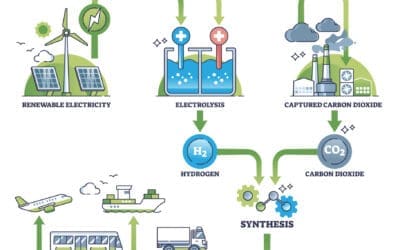HVO Blog
Find up to date news and resources relating to HVO Fuel and HVO Storage
Ready to make the switch to HVO?

Navigating Renewable Fuel Compliance in the UK
Read our clear, no-fluff guide to understanding the RTFO, the Zemo RFAS, and what ISCC certification really means—plus how these standards impact your fuel choices, compliance obligations, and procurement decisions.
HVO vs Diesel: Why Councils are Choosing HVO for Cleaner Fleet Operations
Hydrotreated Vegetable Oil (HVO) is a next-generation renewable diesel made from waste oils, fats and other sustainable materials through a refining process called hydrotreatment, Learn more about what HVO fuel is her HVO vs diesel fuel - Which is better for cleaner...
HVO in Europe update: Why Fleets Need On-Site HVO Storage
Extensive HVO networks: Netherlands, Germany, Ireland Sweden, Finland and Italy. Growing coverage: France, Belgium, UK, Denmark, Spain. Emerging access: Wider EU expansion expected through 2025. HVO is now widely available across Europe, but public coverage remains...
Fleet Cost Savings: Public Sector Fleet Management Solutions
As local governments work towards sustainability targets, reducing operational costs remains a top priority, especially for those managing large vehicle fleets. One of the most promising solutions is Hydrotreated Vegetable Oil (HVO) fuel, a renewable diesel...
The Role of HVO Fuel in Optimising Public Sector Fleets
As governments worldwide intensify efforts to reduce greenhouse gas (GHG) emissions, public sector fleets face growing pressure to adopt sustainable practices. With decarbonisation targets approaching, particularly in the UK and Europe, public fleets need efficient,...
What is the Future of Hydrogen Fuel For Public Sector Vehicles?
Hydrogen fuel has long been considered a promising alternative for decarbonising public sector fleets. With its potential to eliminate tailpipe emissions and reduce reliance on fossil fuels, hydrogen is often described as the fuel of the future. But what is the future...
E-Fuels: A Promising Alternative for Sustainable Transportation in the Public Sector
As public sector organisations aim to reduce carbon emissions, fleet managers face the challenge of finding viable alternatives to traditional fuels. E-fuels, synthetic fuels produced from renewable electricity and captured carbon dioxide, have gained attention as a...
HVO Fuel or Battery Electric: Which is Greener?
As the automotive industry continues to evolve towards sustainability, the question of which vehicle type offers a greener solution has become more complex. Should decision-makers favour a new Battery Electric car powered by gas-fuelled power stations, or a used Euro...
HVO Fuel vs Electric Vehicles: A Practical Comparison
As governments and public sector organisations evaluate HVO fuel vs electric vehicles in their efforts to meet stringent sustainability targets, the transition from fossil fuels has gained urgency. Electric vehicles (EVs) were once heralded as the primary solution to...
Master 2030: Why Choose HVO Fuel for Public Sector Fleets
The transport landscape is rapidly changing, driven by the push to eliminate petrol and diesel vehicles by 2030. Governments worldwide have set ambitious targets to decarbonise transport, with the UK’s Clean Growth Strategy being a notable example. However, as recent...
The Profound Way Renewable Transport Fuels are Transforming Europe’s Public Sector
The transition to renewable transport fuels is essential in the global effort to combat climate change. These fuels, derived from sustainable resources, offer a cleaner alternative to fossil fuels, particularly in the transport sector, which is a significant...
Renewable Fuels for Public Service Vehicles: The UK’s Path to Sustainable Transport
As the UK progresses towards its ambitious goal of phasing out diesel vehicles, particularly within public service fleets, the transition to renewable fuels is both a necessity and an opportunity. The pressing need to reduce carbon emissions and meet...
Why HVO Fuel is the Best Interim Solution for Public Service Vehicles
Hydrotreated Vegetable Oil (HVO) fuel is gaining recognition as a crucial interim solution for public service vehicles, including fire engines, ambulances, and refuse trucks. This renewable diesel alternative is especially relevant given the current challenges faced...
Hydro Fuel at the Olympics: A Commentary on the Open Letter from Scientists
As we approach the 2024 Paris Olympics, an open letter from scientists has sparked a debate about the use of hydro fuel vehicles at the event. This article aims to provide a balanced perspective on the issue, considering both the concerns raised by the scientists and...
E85 Fuel UK: A Missed Opportunity for Sustainable Transport?
E85 Fuel UK: As Europe makes strides towards sustainable transport, the UK seems to be lagging behind. A recent article from ePURE highlights how countries like France and Finland are embracing E85 superethanol, while the UK remains conspicuously absent from this...
Why HVO Fuel Is The Best Choice For Commercial Vehicles
With the UK Government tightening emissions standards and a push for sustainability, commercial vehicle fleets are under pressure to find fuel sources that don't compromise performance or increase storage complexities. This is why HVO fuel is the best choice for...
The Limitations of CNG, LNG, Electric, and Hydrogen Fuels for Commercial Vehicles: A Critical Analysis
The Limitations of CNG, LNG, Electric, and Hydrogen Fuels for Commercial Vehicles: The UK government aims to decrease greenhouse gases and gradually phase out diesel vehicles. As alternatives, CNG, LNG, electric, and hydrogen fuels are well-known contenders. Here's a...
The UK Government is Phasing Out Diesel: Understanding the Transition to Cleaner Fuels
The UK government is advancing its environmental agenda with a decisive move to phase out diesel vehicles. In response to the pressing issues of air quality and climate change, there has been a concerted effort to reduce emissions from transport, which is a...
How to Store HVO Fuel: Best Practices for Longevity and Safety
How to store HVO fuel (Hydrotreated Vegetable Oil) is becoming a more pertinent question due to the emerging popularity of HVO being a viable alternative fuel for vehicle fleets including ambulances, police vehicles, and fire services. Utilised by local governments...
Can I Mix Diesel with HVO Fuel?
Yes, you can mix diesel with HVO fuel, and many diesel engines can run on this blend without issue. However, notr without risk if the process and transition isn't managed properly. Blending can increase sediment risks, particularly in tanks that previously stored...
What is HVO Fuel? The Low-Carbon Diesel Alternative Explained
Hydrotreated Vegetable Oil (HVO) fuel is a widely adopted renewable diesel alternative, recognised by industry leaders and certified under major regulatory frameworks that offer a low-carbon solution for fleets, businesses, and public sector transport. Made from waste...




















